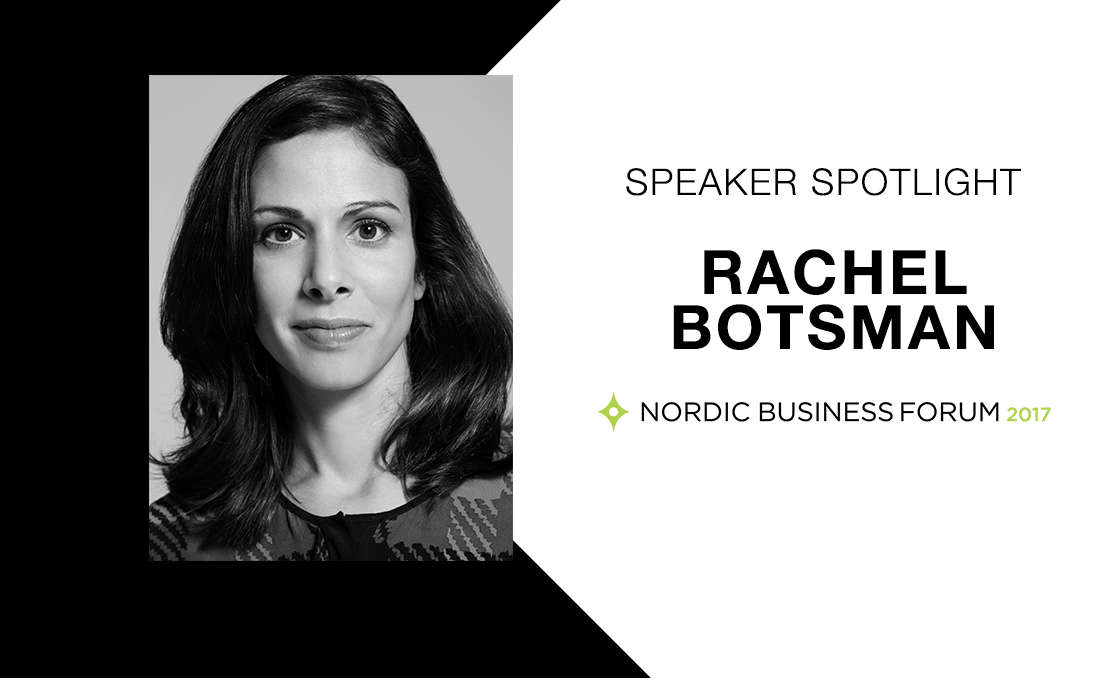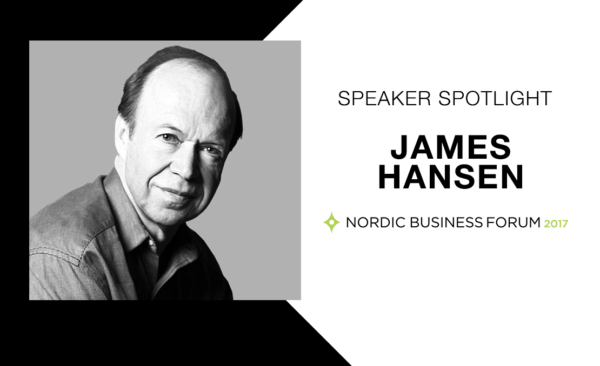21Aug2017
To continue our 2017 Speaker Spotlight series, we are proud to present Rachel Botsman!
Speaker Spotlight
Welcome to the new era of trust. New to town? Stay with Airbnb. Need a ride? Go with Uber. Want a date? Head to Tinder. The popularity of these services and more indicates a mental shift at a granular level; as a society, we trust people more than established institutions. When is the last time you arranged a trip with a travel agency? This new bottom-up system of trust has brought about interesting changes in consumer behaviors.
Rachel Botsman is the global authority on trust and the power of collaboration enabled by digital technologies. Botsman has given speeches and written extensively on how technology is transforming human relationships. We recently sat down with her (virtually) to discuss how trust influences life, work and how society does business.
Nordic Business Forum: Hi Rachel. Let’s start with the basics… why should we “trust” you?
Rachel Botsman: To do what?!
Seriously, trust varies from situation to situation, relationship to relationship. Put simply, trust is highly contextual. We need to think of trust as trusting someone to do something. For instance, you can trust me to write an article or to present a speech but trusting me to, say, drive a lorry would be a grave mistake.
I have been studying trust in the digital age for more than a decade. My first book, What’s Mine is Yours, unpacked the rise of the collaborative or sharing economy. My upcoming book Who Can You Trust? explores a paradigm shift happening before our very eyes – the massive transfer of trust away from institutions and towards each other.
My approach is to combine the research rigor of an academic, the storytelling of a journalist and the pattern observations of a social scientist. Most importantly, I feel passionate that who and how we trust is one of the most critical issues of our time. I am not trying to sell the audience anything but share my knowledge and curiosity around the topic in ways that, hopefully, shifts their way of thinking.
NBF: Could you give us a sneak peek into your NBForum 2017 keynote?
RB: Ah, trust me it will be both educating and entertaining….
NBF: You’ve previously discussed an interesting concept, the trust leap. Could you explain it?
RB: A trust leap occurs when we take a risk and do something new or in a fundamentally different way. Do you remember the first time you put your credit card details into an internet site? That is a trust leap. When we let self-driving cars take over the wheel or turn to a financial bot for advice that is a leap. The first time we leap, it feels a bit weird, even risky, but we soon get to a point where the idea seems normal. Our behaviors transform, often relatively quickly. And when others see that enough people have survived the leap and benefited from it, millions will follow.
Trust leaps create new possibilities; they break down barriers and help us form new relationships.
NBF: Startups today are born into this new trust economy. What tactics should they be using to build trust with customers from the start?
RB: First and foremost is understanding that trust is something you have to earn; it’s not a given… Second is embracing that trust is not a marketing or communications campaign. There is nothing worse than a list of company values or a tagline with the word ‘trust’ front and center. In the same way that a company has a clear strategy around say, product development or customer experience, startups need to think carefully through how to build and maintain trust. In my new book, I explore lots of different ways to do this. For instance, there’s no doubt social proof builds trust around new ideas, especially when we are uncertain of the outcomes. But social proof does not have to come from large crowds. It can also come from a small group of individuals, with a unique power to influence. I call these people ‘trust influencers’; groups of people who can disproportionately influence a significant change in the way we do something; they set new social norms.
NBF: Convenience is typically an important factor when consumers make decisions. Have you found that people value trust over convenience?
RB: This is a really important question. One of the biggest issues of time is whether we give our trust away too easily. With our appetite for on-demand experiences that deliver convenience and choice with a click, swipe or push of a button, we often do not stop and think before we give our trust to someone, whether that be a real life human being or increasingly an artificially intelligent bot.
I mean, I find it a little disconcerting that after searching for a dress online, every advertisement in my social media feeds start to point me to a destination. And it sometimes feels weird that Google Maps knows where I am going because it has checked my calendar. For me, this is at times a bit creepy. For others, it’s pure convenience. The big question is where to do we draw the line in terms of value convenience over trust?
NBF: Peer-based rating systems, such as on Airbnb and Uber, have encouraged positive behavior and feedback. But could this system also cause people to avoid leaving bad reviews out of a fear of being denied the service? Is it honest?
RB: If you have experienced an Uber driver saying at the end of a trip, ‘You give me five stars, I’ll give you five stars,’ that’s tit for tat or grade inflation in action. Whether we are using our real name or a pseudonym, we fear retaliation and also hope our niceties will be reciprocated. It would be easy to conclude, then, that the ratings we rely on to make assessments are often not an accurate reflection of the experience. But they can still make us more accountable to one another. For instance, I sometimes drop towels on the bathroom floor when I am staying in a hotel. But I would never do this as a guest staying in someone’s home on Airbnb. Why? Because I know the host will rate me, and that rating is likely to impact my booking requests being accepted by other Airbnb hosts in the future. It illustrates how online trust mechanisms will impact our real-world behaviors in ways we can’t yet even imagine.
NBF: We’ve seen the travel, retail and dating industries make the switch to distributed trust. Which industry do you think is up next?
RB: Without a doubt, it will be insurance. Not only is it typically a grudge product but it’s full of complex processes and intermediaries that ultimately don’t add value for the end customer. For too long, it has operated as a black box system where the average person does not understand how it works. And the customer experience and design of services are generally the pits. I think the likes of Lemonade, Traity, and Bought By Many are just the tip of a wave of Insuretech coming…
NBF: If people reading this interview learn only one thing from you, what should it be?
RB: The conventions of how trust is built, managed, lost and repaired are being turned upside down. It’s both a challenge and a massive opportunity.
We’re excited to learn more from Rachel Botsman at NBForum 2017! We’re already sold out, but if you’d like to hear Botsman and other leaders discuss this year’s themes of purpose, responsibility, and leadership, be sure to grab your Live Stream license today. Follow us on Facebook (@NBForumHQ) and Twitter (@NBForumHQ and #NBForum2017) to keep up with our speaker announcements as we get closer to the event!

 by:
by: 
